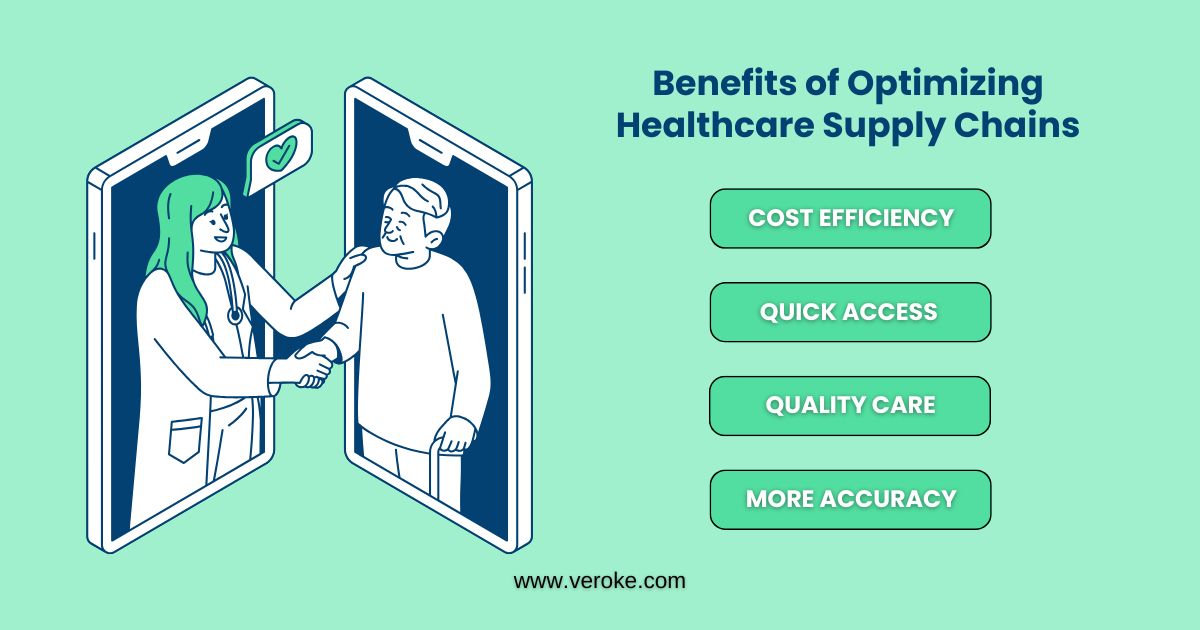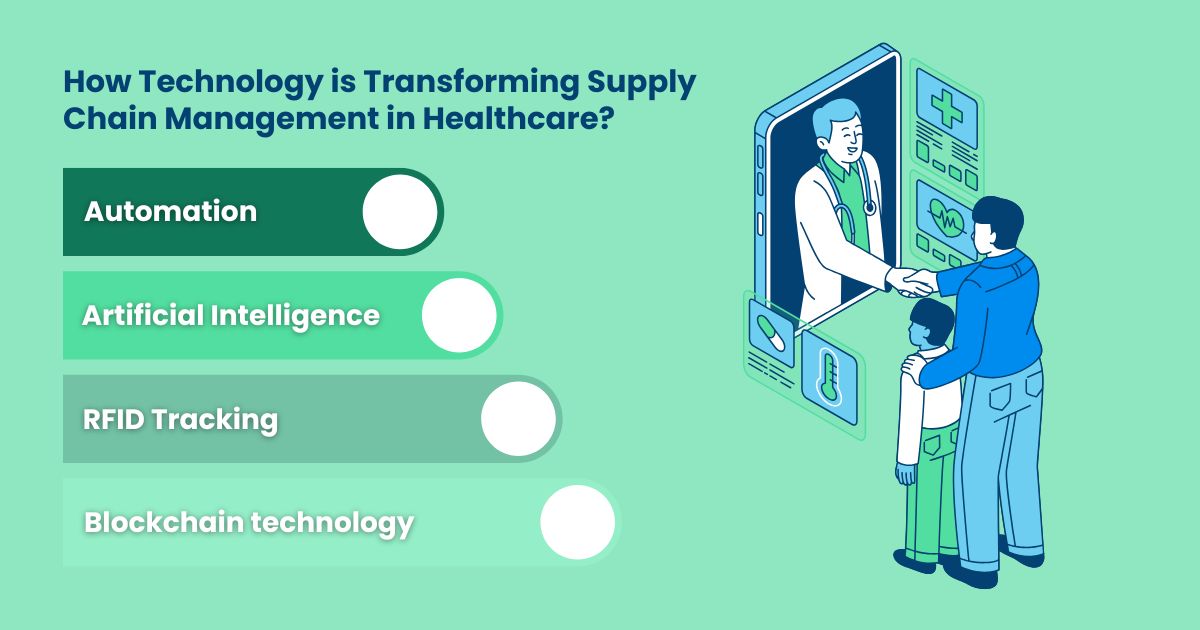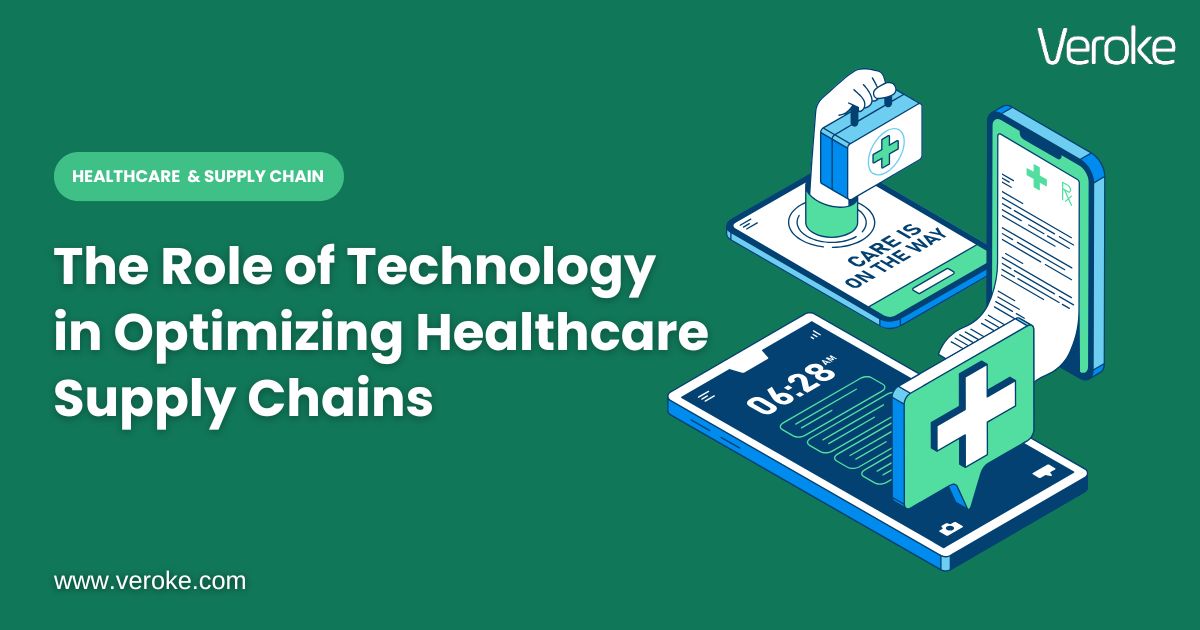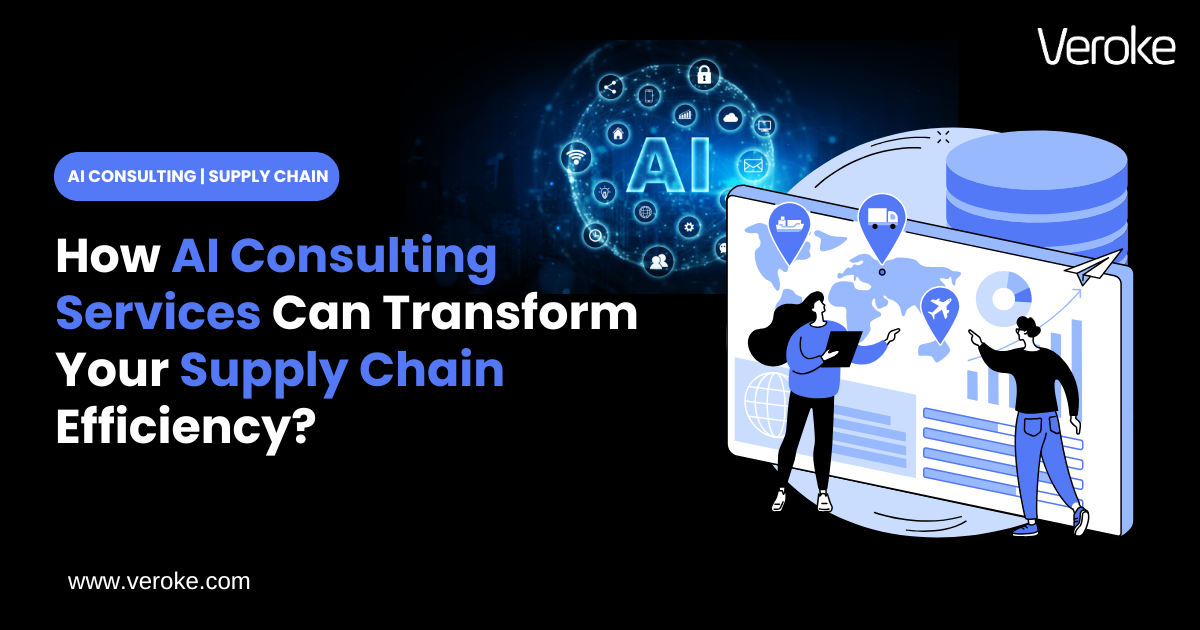Overview
Subscribe to Our Newsletter
Get expert guidance on various topics, resources, and exclusive insights
The Role of Technology in Optimizing Healthcare Supply Chains
Have you ever wondered how hospitals manage to have life-saving medications, medical equipment, and essential supplies ready exactly when and where they’re needed?
Behind the scenes, a sophisticated network of supply chain management (SCM) and logistics keeps healthcare facilities stocked. But outdated processes, inefficiencies, and a lack of transparency often slow things down, sometimes with serious consequences.
Fortunately, technology is stepping in to address these challenges. By enhancing efficiency, reducing costs, and ensuring timely deliveries, digital tools are optimizing the way medical supplies move from point A to point B. From automation and artificial intelligence (AI) to blockchain and the Internet of Things (IoT), these innovations aren’t just simplifying operations—they’re saving lives.
Let’s explore how technology is transforming healthcare supply chains and why it matters to everyone.
Key Takeaways
- AI, blockchain, RFID, and automation collectively enhance efficiency, cut costs, and ensure the timely delivery of essential medical supplies.
2. Digital solutions go beyond simple inventory management by preventing shortages, reducing waste, and minimizing unnecessary expenses, thus improving overall hospital operations.
3. Automation and real-time tracking streamline distribution, ensuring quick and accurate access to medical supplies—directly contributing to better patient care.
What is Healthcare Supply Chain Management?
Imagine a system that ensures hospitals and clinics never run out of vital tools—like medications, surgical instruments, and diagnostic equipment—right when they’re needed most.
That’s essentially what healthcare supply chain management does. It covers every step of the process, from sourcing and purchasing to storing and distributing crucial supplies, directly impacting patient care.
With rising healthcare demands, smart supply chain solutions are no longer an option, they’re essential. In fact, by 2026, it’s projected that nearly 70% of U.S. hospitals and healthcare systems will adopt cloud-based supply chain management solutions for better data access, improved transparency, and smarter decision-making.
So, how exactly is technology making a difference in all of this? Let’s get into it.

Impact of Technology Optimizing Healthcare
Optimizing Healthcare Supply Chains: A Necessity or Just Hype?
Are outdated supply chain systems draining your hospital’s resources and time?
If yes, then you have to understand that the healthcare industry can’t afford inefficiencies, particularly in this rapidly evolving era of tech.
Rising costs, frustrated patients, and supply shortages all point to the same conclusion: traditional methods simply can’t keep up.
That’s where digital supply chains step in—smarter, faster, and future-ready.
1. Lower Costs Without Compromising Quality
Rising expenses and shrinking profit margins put pressure on healthcare providers. Digital supply chains automate inventory management, cut waste, and ensure supplies reach the right place, leading to smarter spending and less financial stress.
2. More Time for Patient Care
You as doctors and nurses didn’t sign up for endless paperwork and supply shortages. By streamlining logistics and reducing wait times, digital solutions free up valuable time—allowing healthcare professionals to focus on what matters most: their patients.
3. Fewer Errors, More Accuracy
Why do hospitals end up overstocked or run out of essentials? The culprits: outdated processes and human errors. Digital supply chains reduce mistakes, standardize operations, and maintain efficiency.
Digital transformation in healthcare isn’t just a buzzword; it’s the future. The real question is: will your hospital stay ahead of the curve or risk being left behind?

Technologies Transforming Healthcare Supply Chain Management
Why Technology Is the Secret Sauce for Healthcare Supply Chains?
Technology is changing the way hospitals manage medications, equipment, and supplies. From AI’s predictive power to smart inventory management, modern innovations tackle long-standing inefficiencies.
Let’s have a look at how modern technology tackles these challenges head-on.
1. AI: The Crystal Ball of Supply Chains
Predictive analytics powered by AI can reduce supply chain costs by 20–30%, a game-changer for hospitals.
Imagine knowing exactly how much stock you’ll need in advance. AI analyzes past data, demand trends, and external factors like seasonal changes to ensure optimal inventory levels.
AI-powered supply chains mean:
- Better demand forecasting to prevent shortages or overstocking
- Optimized procurement to reduce costs
- Faster responses to unexpected disruptions
No more understocking (risking lives) or overstocking (wasting money). AI ensures hospitals have what they need, exactly when they need it.
2. RFID Tracking: Never Lose a Stethoscope Again
Ever wondered how hospitals keep track of thousands of medications and medical devices? Radio-frequency identification (RFID) is revolutionizing inventory management.
With RFID tags, hospitals can:
- Track and monitor supplies in real-time
- Quickly locate critical medical equipment, reducing wasted time
- Maintain optimal stock levels and prevent shortages
Faster access to essential tools means quicker emergency response times, potentially saving lives. RFID technology brings transparency, minimizes human error, and improves operational efficiency.
3. Blockchain: The Trust Machine
Blockchain isn’t just for cryptocurrency, it’s transforming security and transparency in healthcare.
Imagine tracking a single dose of medication from the manufacturer to a patient’s bedside. Blockchain makes it possible by:
- Preventing counterfeit drugs from entering the supply chain
- Creating a tamper-proof record of every transaction
- Giving healthcare professionals real-time, trustworthy data
Major pharmaceutical companies are already using blockchain to safeguard supply chains, ensuring patients receive only genuine medications.
4. Robotic Process Automation: The End of Human Error
Humans make mistakes but in healthcare, even small errors can be costly.
That’s where Robotic Process Automation (RPA) comes in. By handling repetitive tasks, RPA reduces errors and saves time.
Automation improves:
- Inventory management with smart warehouses, reducing labor costs
- Delivery routes, ensuring faster and cost-effective logistics
- Order processing, making procurement seamless
By minimizing manual intervention, automation lets healthcare professionals focus on patients, not paperwork.
Why You Should Care About Healthcare Supply Chains?
The optimization of healthcare supply chains affects everyone, whether you are a patient relying on timely treatments, a healthcare professional ensuring seamless care, or simply someone invested in the future of medicine.
A well-functioning supply chain is about more than logistics. It’s about:
- Reducing costs so healthcare remains affordable
- Ensuring hospitals have what they need to save lives
- Building a system that can withstand future challenges
Think about it: every piece of medical equipment, every dose of medication, and every essential supply has to undergo a complex journey before reaching the right hands at the right time. Without efficiency, delays occur, costs soar, and patient care suffers.
This is where AI, blockchain, and RFID come into play, not as buzzwords, but as powerful tools. Technology isn’t just reshaping healthcare supply chains, it’s transforming how we think about medical logistics.
It would be wrong to say that digital advancements are paving the way for a smarter, more responsive healthcare system.
So, the real question is: how quickly will your healthcare center adopt these digital transformations to stay ahead, rather than risk falling behind?
How Veroke Can Help You Optimize Healthcare Supply Chains?
At Veroke, we don’t just develop software, we transform industries with smart, digital solutions. Our expertise in creating bespoke healthcare solutions empowers healthcare providers with advanced supply chain management systems that enhance security, efficiency, and transparency.
With a proven track record of optimizing operations with custom solutions in health tech and supply chain, we know what it takes to transform your idea into a digital reality. From small healthcare centers to large hospitals and delivery networks, we help organizations streamline operations and stay ahead in the digital revolution.
If you’re ready to transform your supply chain management for your healthcare? Get in touch with us today and start building a smarter, stronger, and more resilient healthcare ecosystem.
FAQs
1. What role does technology play in optimizing supply chain processes?
Supply chain automation uses cutting-edge technologies like robotics, artificial intelligence, and machine learning to optimize and streamline a number of processes. This change minimizes errors, boosts efficiency, and lessens the need for manual intervention.
2. Which technology is commonly used for real-time monitoring of supply chain activities?
Real-time monitoring involves tracking products and processes dynamically throughout the supply chain utilizing advanced technologies such as GPS, blockchain, and the Internet of Things. This ensures continuous visibility, allowing companies to swiftly identify issues and make more informed decisions.
3. How is AI used in the supply chain?
AI is used by businesses to improve worker safety, estimate demand for particular parts and components, track inventory, manage warehouse capacity, optimize shipping and delivery, and help maintain the integrity of transaction records across international supply chains.
4. What is supply chain visibility?
The capacity to observe or monitor inventory as it flows through the supply chain is known as supply chain visibility. The complete, end-to-end view of a business’s inventory, warehouse, and logistics management procedures and personnel in real-time is known as real-time supply chain visibility.
5. What is the role of technology in supply chain management?
It can help businesses optimize supply chain operations by providing real-time information on inventory levels, production schedules, and delivery dates. This can help them make better judgments about when to schedule production runs, how much to order, and when to order supplies.
Transform your Ideas into a Digital Reality
Get customized bespoke
solutions for your business.




